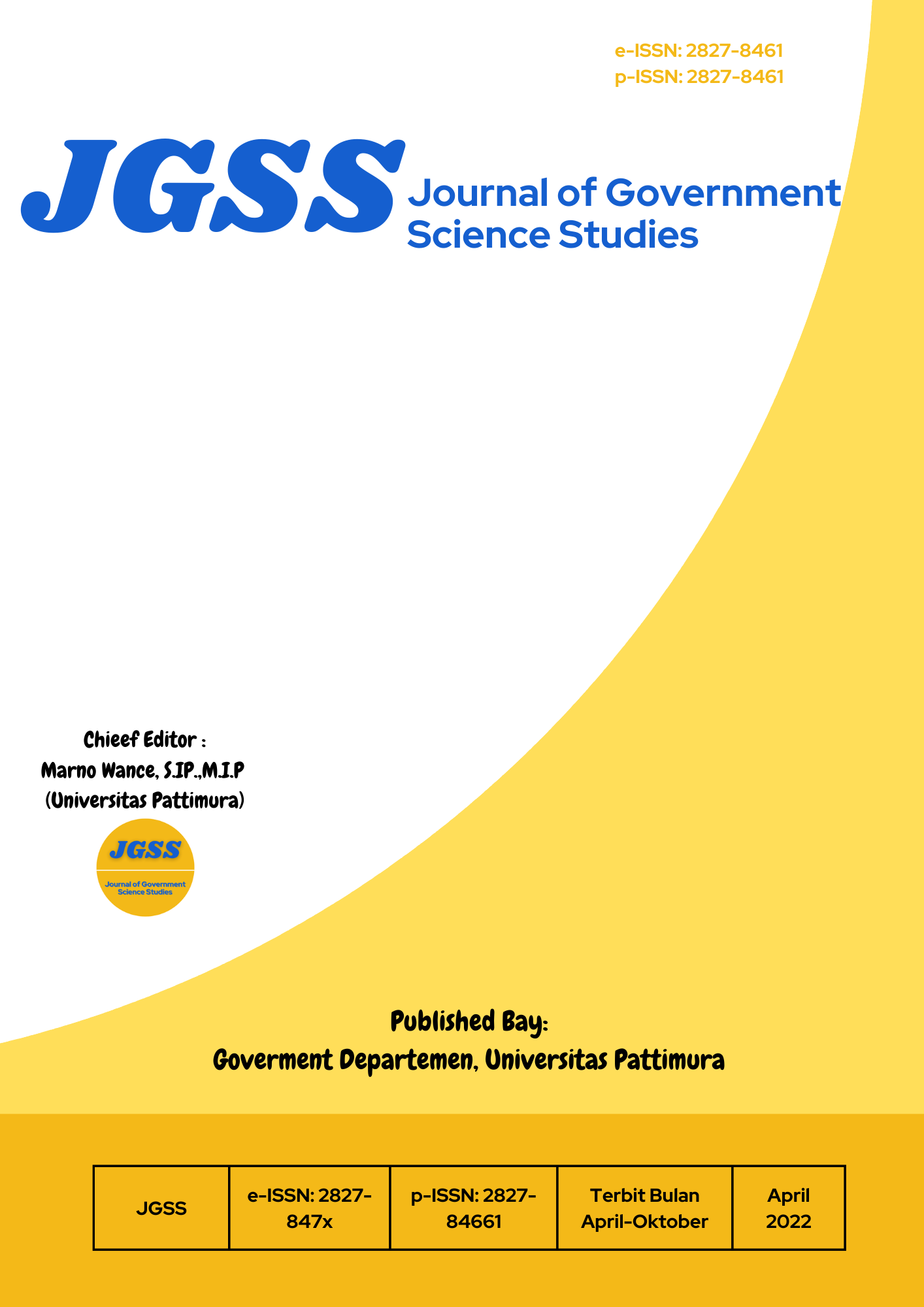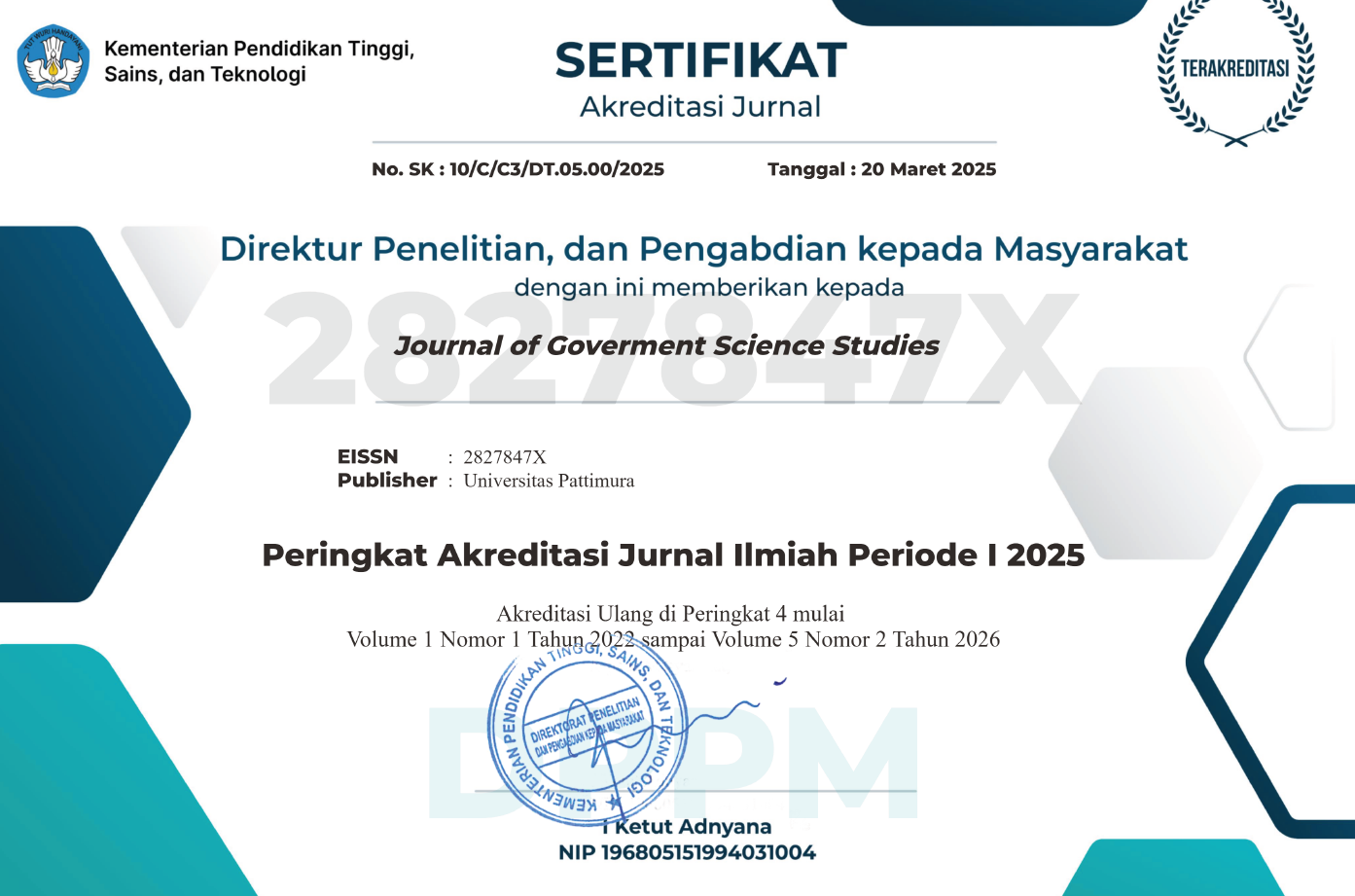Challenges in the Utilization of Technology-Based Administration Services by the Community in Tongke-Tongke Village, East Sinjai District
Abstract
This study aims to analyze the capacity of the community in utilizing technology-based administrative services. The method used is a qualitative research method. The results of the study show that the capacity of the people of Tongke-Tongke Village in general has shown the ability to adopt technology-based administrative services. This can be seen from four main indicators, namely knowledge, skills, awareness, and attitude. In terms of knowledge, most of the younger generation has understood the concept and benefits of digital administration services, although adults and the elderly are still limited in their understanding. In terms of skills, access to devices such as smartphones is quite adequate, but the ability to operate technology is still uneven, especially for people over 40 years old who still need assistance. In terms of awareness, both the community and village officials are beginning to realize the importance of digitizing services as an effort to improve the efficiency and ease of service, although limited socialization has made this awareness not reach all levels of society. Meanwhile, in terms of attitudes, the community and village officials generally show an open and positive attitude towards changes towards a digital system, and have a willingness to learn and follow developments. Overall, the people of Tongke-Tongke Village in general have been able to adopt technology-based administrative services, but further efforts are still needed in the form of training, socialization, and mentoring so that all community groups can participate optimally and equally. The findings of the study show the importance of routine socialization, increasing people's digital literacy. By utilizing the results of this research, the village government can develop a more appropriate strategy to optimize technology-based services to be more effective, efficient, and reach all levels of society.
Downloads
References
Aifalesasunanda, R., Citriadin, Y., & Maujud, F. (2024). Strategi pengembangan sumber daya manusia melalui literasi digital di MTS Nurul Yasin Buer Sumbawa. PENDAKIAN: Jurnal Manajemen Pendidikan Islam Al-Bahjah, 2(1), 42–58. https://doi.org/10.61553/ascent.v2i1.153
Andi Cudai Nur, Haedar Akib, R. N. (2022). Keberadaan administrasi publik dalam arus globalisasi.
Bulo, F., Paembonan, S., Abduh, H., Informatika, T., & Selatan, S. (2025). Aplikasi layanan administrasi kantor desa tombang berbasis website. 13(2).
Fadli, MR (2021). Memahami desain metode penelitian kualitatif. Humanika, 21(1), 33–54. https://doi.org/10.21831/hum.v21i1.38075
Iqbal, T. (2023). Desain Sistem Informasi Layanan Administrasi Masyarakat Desa Berbasis Web di Kecamatan Seunagan Timur, Kabupaten Nagan Raya. 1(2), 145–156.
Jauhari, MT, & Maryono, D. (2024). Efektivitas Inovasi Manajemen dalam Penggunaan Mesin Paviliun Dukcapil Otomatis sebagai Layanan Administrasi Kependudukan di Desa Tegalisatur. 9(2), 813–819.
Julianti, D. (2024). Strategi Kebijakan Penguatan Layanan dengan Aplikasi Berbasis Teknologi Informasi. Bagian 2.
Kartika, D.F., & Oktariyanda, T.A. (2022). Inovasi pelayanan publik melalui aplikasi Poedak (layanan online pendaftaran administrasi kependudukan) di Dinas Kependudukan dan Pencatatan Sipil Kabupaten Gresik. Penerbitan, 245–260. https://doi.org/10.26740/publika.v10n1.p245-260
Khairul Amri, Tutut Ismi Wahidar, Ahmad Fuadi, Dedi Kusuma Habibie, & Geovani Meiwanda. (2022). Kapasitas kelembagaan dalam pengembangan Kawasan Strategis Pariwisata Nasional (KSPN) di Desa Teluk Rhu, Kecamatan Rupat Utara, Kabupaten Bengkalis. Jurnal Neurologi, 15(2), 379–387. https://doi.org/10.31849/niara.v15i2.10852
Mendrofa, YFJ, Lase, D., Waruwu, S., & Mendrofa, S.A. (2023). Analisis kebutuhan pelatihan dan pengembangan perangkat desa di Kabupaten Alasa Talumuzoi dalam meningkatkan pelayanan publik. Tuhenori: Jurnal Ilmiah Multidisiplin, 1(1), 11–21. https://doi.org/10.62138/tuhenori.v1i1.5
Musthofa, A., Lukito, C., & Suhindarno, H. (2024). Optimalisasi penggunaan website sistem informasi desa di Kecamatan Malo, Kabupaten Bojonegoro. JIAN - Jurnal Ilmiah Administrasi Negara, 8(2), 58–68. https://doi.org/10.56071/jian.v8i2.884
Nur, A., & Utami, F. Y. (2022). Proses dan Langkah-langkah Penelitian Antropologi: Tinjauan Literatur. Ad-Dariyah: Jurnal Dialektika, Sosial dan Budaya, 3(1), 44–68. https://doi.org/10.55623/ad.v3i1.109
Nury Khirdany, E., Anas, Z., & Al-Muafa, T. (2024). Efektivitas penggunaan website di desa sebagai layanan informasi bagi masyarakat. Jurnal Ekonomi dan Bisnis, 1(1), 1–11.
Rijal, S., Azis, A. A., Chusumastuti, D., Susanto, E., Nirawana, I. W. S., & Legito. (2023). Pengembangan Kapasitas Sumber Daya Manusia dalam Pemanfaatan Teknologi Informasi bagi Masyarakat. Timur Journal of Innovative Community Services, 1(03), 156–170. https://doi.org/10.58812/ejincs.v1i03.123
Salman. (2024). Digitalisasi birokrasi: efisiensi layanan di Disdukcapil Sinjai. 21(2), 62–69.
Wahyudi, A., & Yamin, A. (2025). Pengaruh Teknologi Informasi, Kompetensi Sumber Daya Manusia dan Penggunaan Aplikasi Erasmart melalui Desa dan Desa (Lesehan) terhadap Kepuasan Masyarakat (Studi Kasus di Desa Telaga Bertong, Kecamatan Taliwang, Kabupaten Sumbawa Barat). 8, 4962–4979.
Zahra, H. Al, Febrian, E., & Amar, SCD (2019). Faktor-faktor yang Mempengaruhi Sikap dan Niat Penyelenggara Koperasi untuk Menggunakan Platform Layanan Keuangan Digital di Kota Bandung. Jurnal Manajemen, 10(2), 155. https://doi.org/10.32832/jm-uika.v10i2.2572
Copyright (c) 2025 Husnul Amalia, Muhammad Takdir, Abd Wahid

This work is licensed under a Creative Commons Attribution-ShareAlike 4.0 International License.








.png)





